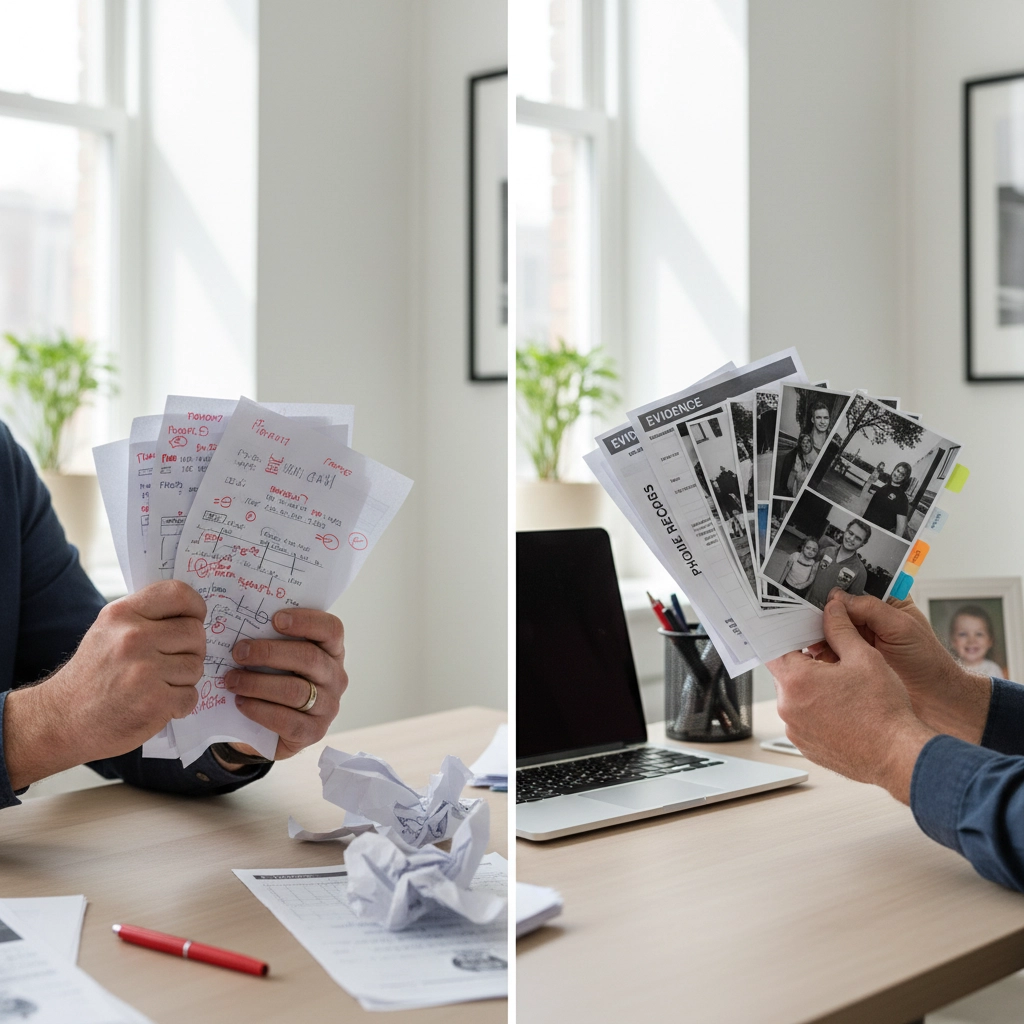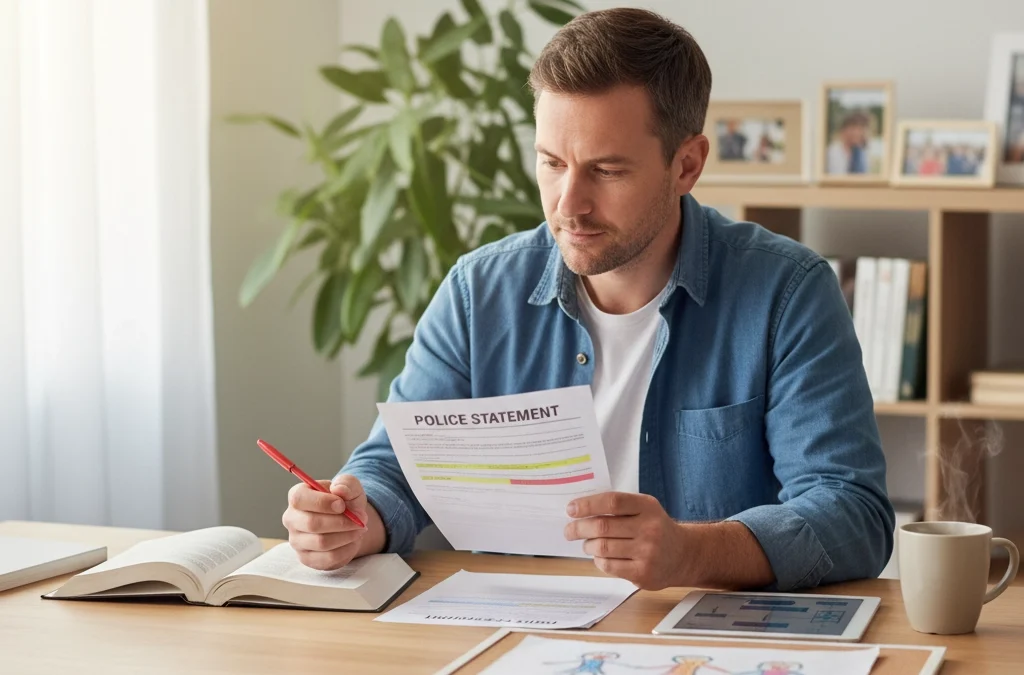You deserve the truth to be heard. When police statements contain errors, lies, or misrepresentations, they can destroy your chances in family court and rob you of precious time with your children. But here's what they don't want you to know: you have the power to challenge fake police claims and expose lies in court.
Every Dad Matters. That's why we're giving you the no-nonsense tools to spot errors in police statements and fight back against false allegations that could cost you everything.
Why Police Statements Can Make or Break Your Case
Police reports carry enormous weight in UK family courts. Judges often treat them as gospel truth, even when they're riddled with errors, bias, or outright lies. This isn't fair: but it's reality.
When officers respond to domestic incidents, they're making split-second judgments under pressure. They don't know your history, your character, or the full context of what happened. Yet their hastily written reports can determine whether you see your children or become labelled as a threat.
Here's the harsh truth: Many police statements contain serious errors that favour the complainant: usually your ex-partner. These errors aren't always accidental.

Common Errors That Destroy Fathers' Cases
Misquoted Statements
Officers often paraphrase what you said, changing your meaning entirely. "I was frustrated" becomes "I was angry and threatening." These subtle changes paint you as dangerous when you were simply expressing normal human emotion.
Missing Context
Police reports frequently omit crucial background information. They'll document her tears but ignore the fact she was preventing you from seeing your children. They'll record your raised voice but not mention she'd just threatened to make false allegations.
Biased Language
Watch for loaded words that make you sound like the aggressor. "Confronted" instead of "approached." "Aggressive" instead of "assertive." "Demanded" instead of "asked." This language frames you as the problem before you even step into court.
Factual Mistakes
Simple errors like wrong dates, times, or locations can undermine your entire timeline. If the report says you were arguing at 3pm but you were at work with witnesses, that's your smoking gun.
One-Sided Reporting
Many officers fail to properly investigate both sides of the story. They'll take detailed statements from her but barely listen to your version. This creates a narrative that serves her interests perfectly.
Your Action Plan: Spotting the Lies
Get the Full Report Immediately
Don't wait. Request the complete police report as soon as possible. Many errors only become obvious when you see the official documentation. Every day you delay gives false information more time to solidify in the system.
Compare Against Your Records
Pull out your phone records, bank statements, work schedules, and any other documentation from that day. Look for inconsistencies between what actually happened and what the report claims.
Identify Witness Gaps
Did the police speak to witnesses who could support your version? If they ignored people who saw what really happened, that's a red flag. Document who was present but wasn't interviewed.

Check for Missing Evidence
Were there CCTV cameras nearby? Text messages that prove your point? Audio recordings? If the police didn't collect obvious evidence that would help your case, question why.
Fighting Back: Correcting Police Statement Errors
Contact the Reporting Officer First
Start by calling the officer who wrote the report. Be professional but firm. Present your evidence clearly and request corrections. Some officers will amend reports when faced with clear proof of errors.
Document Everything
Keep records of every phone call, email, and meeting. If they refuse to correct obvious errors, you'll need this paper trail for court. Screenshot text messages, save voicemails, and get witness statements in writing.
Request Supplemental Reports
If the original officer won't budge, ask for a supplemental report that adds missing information or corrects errors. This creates an official record of your concerns without requiring the original officer to admit mistakes.
Know When to Escalate
Some errors are too serious to handle informally. When police refuse to correct clear factual mistakes or when their report contains obvious bias, it's time for legal intervention.

Exposing Lies in Court UK: Your Legal Rights
Challenge Hearsay Evidence
Police reports often contain hearsay: what someone told the officer rather than what they observed directly. In family court, you can challenge hearsay evidence, especially when it's unreliable or biased.
Cross-Examine the Officer
If the police officer gives evidence in court, you or your solicitor can cross-examine them about errors, missing evidence, and investigative failures. This is your chance to expose shoddy police work.
Present Contradictory Evidence
Bring documentation, witness statements, and physical evidence that contradict the police report. When you can prove the report is wrong about verifiable facts, it undermines the entire document's credibility.
Highlight Bias and Discrimination
UK fathers' rights advocates know that police often show gender bias in domestic incidents. If the report shows clear bias against you as a father, make this an issue in court.
When Police Statements Contain Serious Lies
False Domestic Violence Allegations
This is warfare disguised as protection. When your ex-partner makes false allegations and police write them up as fact, it's not just unfair: it's potentially criminal. False allegations waste police resources and destroy families.
Document the Pattern
If this isn't the first false allegation, document the pattern. Repeated false claims show malicious intent and can backfire on the accuser if properly presented in court.
Gather Character Evidence
Collect statements from friends, family, colleagues, and neighbours who know your true character. Their testimony can counter false allegations and show the court who you really are.

Protecting Yourself Moving Forward
Record Interactions
In England and Wales, you can legally record conversations you're part of. Start recording interactions with your ex-partner (when legal to do so) and always have witnesses present when possible.
Stay Professional
Never give them ammunition. Keep your cool, speak respectfully to officers, and avoid any behaviour that could be twisted against you. Remember: everything you say and do may end up in a report.
Build Your Support Network
Connect with other fathers who've faced similar battles. Their experiences and advice are invaluable. Join our community of fathers fighting for their rights and supporting each other through these challenges.
Your Rights Don't End with a Police Report
You have the right to challenge false information. You have the right to present evidence. You have the right to cross-examine witnesses. Most importantly, you have the right to fight for your relationship with your children.
Don't let a biased, incomplete, or false police report be the final word on your case. These documents are not sacred texts: they're fallible reports written by humans under pressure, and they can be challenged.
Fathers United. Rights Respected.
The system may be stacked against us, but we're not powerless. Every corrected error, every exposed lie, every successful challenge makes it easier for the next father facing the same battle.
Ready to fight for your rights? Document everything, challenge errors immediately, and never accept false information as truth. Your children are watching, and they need you to stand strong.
Every Dad Matters. Your story matters. Your truth matters. And your fight for justice matters: not just for you, but for every father who comes after you.

Join us in exposing fake police claims in family court and protecting fathers' rights across the UK. Together, we're stronger. Together, we win.

